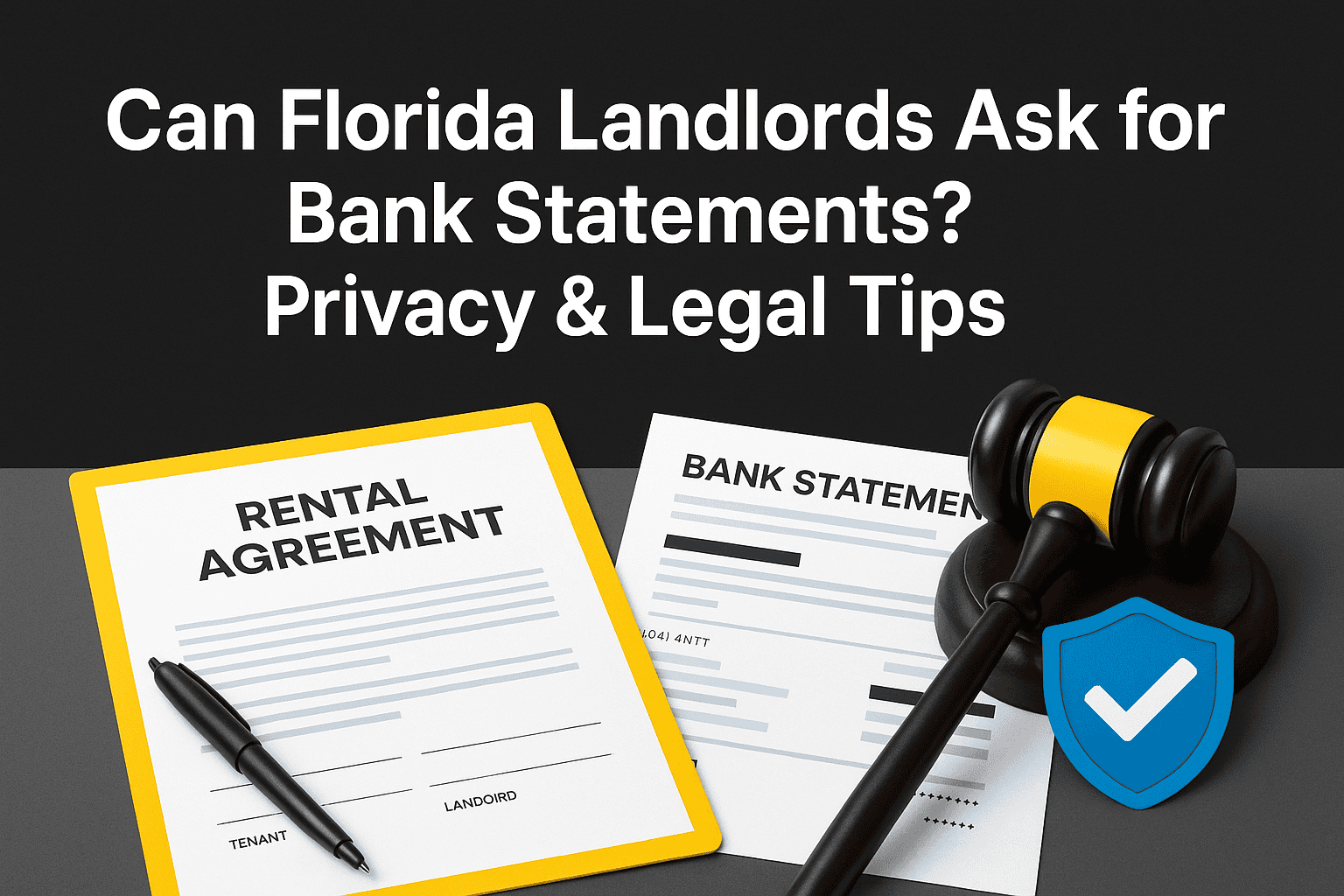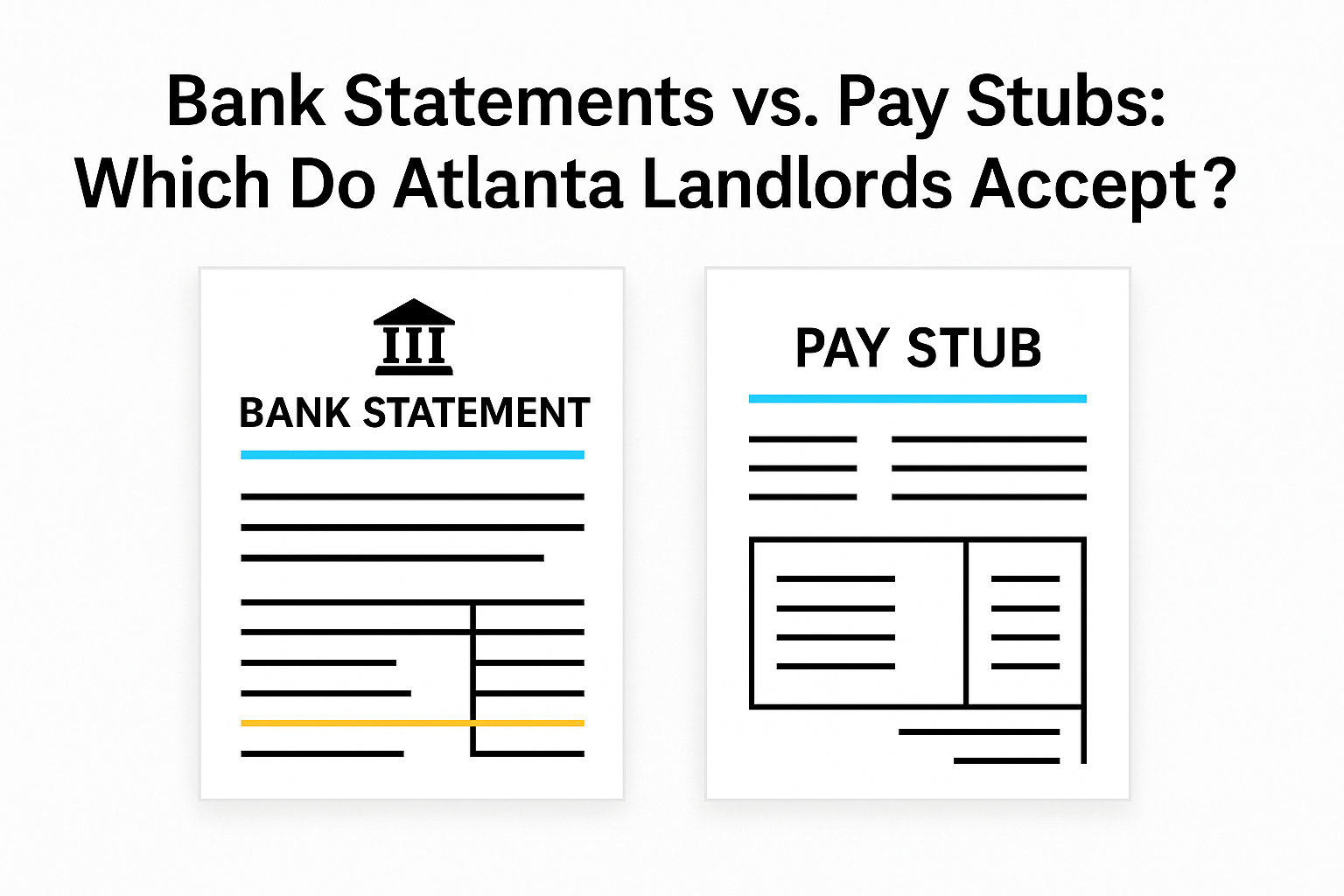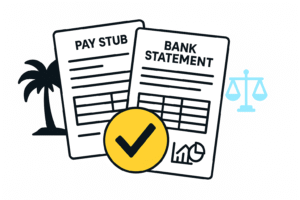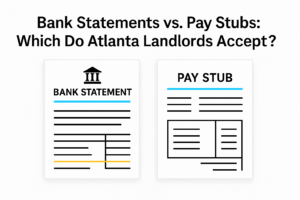Last updated: September 2025
Landlords and underwriters across the US, UK, and Canada routinely ask applicants to share bank statements. In Florida’s fast‑moving rental market, these requests can feel intrusive if you’re not prepared. This article answers the question: Can Florida landlords ask for bank statements and how should you respond while protecting your privacy?
We clarify when a Florida landlord may request statements, how privacy laws apply in each market, and why professional formatting — not falsification — matters. You’ll also get real‑world mini‑scenarios and a practical checklist so you can submit a clean, compliant packet without oversharing.
FinancialDocsProvider.com specializes in organizing and formatting genuine income documents to improve readability and compliance. We never alter amounts, dates, or parties. We focus on redaction, orientation, pagination, and clarity so your materials present a complete, audit‑ready picture. If you’re unsure what edits are allowed or how to safeguard sensitive data, this guide is for you.
Related Entities & Terms
- Proof of income, affordability assessment, tenancy referencing
- Bank statements, transaction history, deposit verification
- W‑2 wages (US), 1099 income (US), T4 slips & Notice of Assessment (NOA) (CA)
- Pay stubs / payslips; direct deposit verification
- Self‑employment: invoices, ledgers, profit & loss statements
- Anti‑Money Laundering (AML) and Know Your Customer (KYC) regulations
- Consumer Financial Protection Bureau (CFPB), Federal Trade Commission (FTC) and Internal Revenue Service (IRS) in the US
- Financial Conduct Authority (FCA) and HM Revenue & Customs (HMRC) in the UK
- Financial Consumer Agency of Canada (FCAC) and Canada Revenue Agency (CRA)
- Data protection laws: Fair Credit Reporting Act (FCRA, US), Data Protection Act (UK), Personal Information Protection and Electronic Documents Act (PIPEDA, CA)
What are the legal basics of Florida landlord bank statement requests?
Summary: Florida law does not prohibit a landlord from requesting statements as part of a standard screening. The key guardrails are consent, necessity, and fair‑use of your data. Put simply, can Florida landlords ask for bank statements? Yes — but you control what you share, and how.
Landlords request bank statements to validate income and assess affordability. Florida statutes do not ban the practice. However, US privacy rules govern how your information can be collected, shared, and stored. Landlords cannot access your account directly or view live balances. They may ask you to provide PDF statements and supporting proof such as pay stubs, W‑2s, or tax returns to show consistent income.
The Fair Credit Reporting Act (FCRA) applies whenever a consumer report is used for tenant screening. A landlord must have a permissible purpose and obtain your authorization before ordering a screening report. If your application is denied or additional conditions are imposed based on that report, the landlord must issue an adverse action notice. Similar consent‑based frameworks exist in the UK and Canada. In the UK, credit checks and references require your permission; in Canada, data collection must be reasonable and proportionate to the stated purpose.
Reasonableness also matters. You can redact sensitive details and refuse requests for live online‑banking access or passwords. Requestors should only collect what they truly need to verify rent coverage, not unrelated personal information. If a request feels excessive, ask why it’s necessary and offer alternatives: recent pay stubs, an employment letter, a guarantor, or a larger deposit if policy allows. You can decline to provide bank statements; the landlord may then proceed with another qualified applicant.

Practical tip: Submit statements that show your legal name, current address, and steady deposits. Redact account numbers and unrelated transactions to limit exposure. Never provide login credentials and never permit “screen‑sharing” of your online banking during screening.
What to say if asked for unredacted access:
“For privacy and security, I don’t grant live bank access. I’m happy to provide recent PDF statements and pay stubs with account numbers redacted.”
Which edits are allowed on bank statements?
Summary: Lawful edits enhance readability and protect sensitive data without touching facts. Reviewers welcome clean, well‑organized packets because they accelerate underwriting and reduce back‑and‑forth.
Accepted, good‑faith edits include the following:
- Redacting personal identifiers: Black out full account numbers, card numbers, personal identifiers, and unrelated private transactions. Leave names, dates, and balances readable so reviewers can match deposits.
- Correcting orientation and pagination: Combine pages into a single PDF, rotate sideways pages, and add page numbers. Ensure the chronological flow is obvious.
- Improving legibility: Fix skewed scans, adjust contrast, and convert images to searchable PDFs. Poor legibility slows reviews and can trigger unnecessary follow‑ups.
- Highlighting deposits: Use light highlighting or subtle callouts to flag payroll or recurring deposits. Do not over‑annotate or obscure underlying text.
- Adding context: If income fluctuates, attach a short note or table summarizing deposit sources and timing. Keep it factual and easy to verify.
These edits streamline verification while keeping the underlying data authentic. Always retain the original bank PDFs in case a landlord or lender requests them for audit purposes.
- Allowed: Redacting account numbers, fixing page order, improving legibility, adding concise annotations.
- Illegal: Changing amounts or dates, fabricating deposits or pages, or altering payee/payer names.
Formatting hygiene checklist:
- Use consistent file names (e.g., Lastname_Bank_Jun‑Aug2025.pdf).
- Keep redactions obvious and professional; avoid “white‑out” that looks like concealment.
- Ensure page counts match (“Page 1 of 5” through “Page 5 of 5”).
- Verify that visible totals, balances, and dates align across pages.
What bank statement edits are illegal?
Summary: Editing content that changes the truth is fraud. It can cost you the unit, damage your credibility, and expose you to civil or criminal penalties.
Illegal alterations include:
- Changing numbers or dates: Inflating income, shifting dates, or masking overdrafts by altering figures.
- Adding or deleting entries: Inserting “ghost” deposits or removing fees and negative balances.
- Renaming parties: Modifying the sender or recipient on deposits or transfers.
- Manipulating document metadata: Stripping or spoofing metadata to conceal edits.
- Creating fake statements: Generating documents that did not originate from your financial institution, even if they mimic the layout.
Why you will get caught: Underwriters compare totals across pages, validate deposit cadence, and cross‑reference pay stubs, tax forms, and employer letters. Many banks embed security elements and machine‑readable data that flag inconsistencies. If something looks off, reviewers will ask for originals or contact the institution.
Bottom line: Always use genuine statements and rely on professional formatting for clarity — never content manipulation.
When do you need professional document formatting?
Summary: You may not need help for straightforward applications, but professional formatting pays dividends when stakes are high, timelines are tight, or your income is complex. Clean packets reduce friction, accelerate decisions, and minimize sensitive data exposure.
Renters in competitive markets
In high‑demand Florida cities like Miami, Orlando, and Tampa, landlords often receive many applications. If your income comes from multiple sources or varies month to month, a well‑organized packet signals stability. We compile consecutive statements, highlight payroll or regular deposits, and redact sensitive data so decision‑makers see a clear affordability pattern at a glance.
Mini‑scenario: You’re relocating to Miami with a new job offer and a start date next month. We format your last six months of statements, add a single‑page income summary, and include your offer letter. The landlord can verify your trajectory without sifting through raw files.
Auto loans and small business financing
Lenders often request statements alongside tax documents. They’re looking for cash‑flow stability and repayment capacity. We order statements chronologically, reconcile deposits to W‑2s or 1099s, and include a month‑by‑month income table for quick review. This approach helps underwriters focus on facts rather than formatting.
Mini‑scenario: You drive for multiple ride‑share apps and your earnings fluctuate. We aggregate platform payouts, annotate large deposits, and include a short note explaining weekly variability. The packet demonstrates consistent monthly capacity even with uneven daily inflows.
Self‑employed and gig workers
Freelancers, consultants, and contractors often lack pay stubs. In the UK and Canada, bank statements paired with invoices and a Notice of Assessment (or T4/SA302) help validate income. Some review teams accept three months; others want six or twelve depending on risk and complexity.
- Bank statements showing deposits from clients or platforms.
- An invoice log summarizing payment date, client, and amount.
- Tax forms (1099, T4, SA302/NOA) for cross‑verification.
- A brief explanation of your business model and typical cash‑flow cycles.
Mini‑scenario: You consult on seasonal projects with heavy Q2 and Q4 activity. We present twelve months of statements, a seasonal income chart, and a cover note describing your cycle. Reviewers can see the pattern without guesswork.
How does our process work?
Summary: Our service is compliance‑first. We format and organize genuine documents, apply narrowly tailored redactions, and deliver a cohesive packet that reviewers can trust. We do not fabricate, simulate, or “doctor” records — ever.
- Intake & consultation: Upload your bank statements, pay stubs, tax forms, invoices, or employer letters via our secure portal. Tell us your objective and any stated requirements from a landlord, lender, or agent. For scope and pricing, see our proof of income editing and bank statement formatting pages.
- Document reconciliation: We confirm completeness (e.g., consecutive months and full page sets) and cross‑check deposits against pay stubs or invoices. If pages are missing, we flag the gaps so you can request them from your bank.
- Formatting & redaction: We correct orientation, enhance legibility, paginate, and redact sensitive elements such as account numbers or unrelated private transactions. Where helpful, we add a concise income summary or index page.
- Quality check & delivery: A second editor verifies that amounts, dates, and names align across documents. We then deliver a secure PDF packet ready for submission. Typical turnaround is 24–72 hours depending on volume and urgency. For time‑critical work, see our 24‑Hour Docs service.
What we will not do: We will not create, alter, or backdate financial records; add or remove transactions; or manipulate balances. If a request falls outside legal and ethical boundaries, we decline and recommend legitimate alternatives.
What should be on your compliance checklist?
Summary: A pre‑submission check prevents delays and avoidable rejections. Use the list below to pressure‑test your packet before you click “send.”
- ☑ Consecutive statements: Include three to six months, or more if requested, without gaps.
- ☑ All pages present: If a statement says “Page 1 of 5,” include all five pages, even if some appear blank.
- ☑ Clear identification: Your name and current address appear on each statement. If not, attach a utility bill or lease page as proof of address.
- ☑ Consistent income: Lightly highlight recurring payroll or client deposits. If income swings, add a one‑page summary table.
- ☑ Redactions applied: Mask account numbers, card numbers, and unrelated transfers. Keep dates, names, and amounts readable.
- ☑ Matching documents: Cross‑check deposit amounts against pay stubs, invoices, or tax forms (W‑2, 1099, T4, NOA).
- ☑ Legible format: Convert images to PDF, fix skew, improve contrast, and ensure pages are upright.
- ☑ Summary cover page: Include total deposits, average monthly income, and contact information.
- ☑ Supporting documents: Add employment letters, rental references, or guarantor details if requested.
- ☑ Data minimization: Provide only what is needed for the stated purpose; avoid oversharing unrelated spending.
- ☑ Version control: Send a final, locked PDF to prevent accidental edits; keep originals on file.
What red flags cause rejections?
Summary: Reviewers are trained to spot patterns that suggest risk, concealment, or inconsistency. Mitigate these early to keep your application moving.
- Inconsistent income: Sporadic deposits without context. Add a brief explanation or summary table if earnings vary.
- Large unexplained withdrawals: Significant transfers or cash withdrawals without notes. Provide legitimate explanations if applicable.
- NSF fees and overdrafts: Frequent negative balances or non‑sufficient‑funds fees suggest cash‑flow strain.
- Mismatched names or addresses: Ensure statement name matches your ID and application. Attach proof of address when needed.
- Missing pages or odd fonts: Page counts that don’t line up or typography that diverges from bank templates.
- Fabricated documents: Templates without proper logos or with inconsistent transaction codes are common tells.
- Over‑redaction: Redactions that hide relevant entries or totals. Mask only what’s private, not what’s material.
- Unexplained large cash deposits: Cash spikes without documentation. Add receipts or a short note if legitimate.
- Multiple unlinked accounts: Deposits spread across many accounts with no cross‑reference. Provide an index page so reviewers can follow the trail.
Review your packet against this list before submission. If a red flag exists, address it proactively in a short cover note or by adding corroborating evidence.
Where can you find official resources?
Summary: These authoritative sources explain how consumer reports, privacy, and tenant checks work in practice. Use them to understand your rights and obligations.
- FTC: Using Consumer Reports – What Landlords Need to Know – FCRA basics and landlord obligations.
- Shelter England: How landlords and letting agents check tenants – UK consent requirements and reference checks.
- Canada.ca: Prepare financially for living in Canada – Practical budgeting context and affordability guidance.
For more in‑depth insights and step‑by‑step tips, explore these articles on FinancialDocsProvider.com:
- Bank Statement Red Flags: 5‑Point Checklist – a deeper dive into anomalies that delay approvals and how to fix them.
- Pay Stub vs Bank Statement: Which Proves Your Income Better? – when to submit each and why.
- Bank Statements as Proof of Income in Texas: Are They Legal? – similar principles in another state.
- Proof of income editing and bank statement formatting services – how we help you prepare.
- Contact our team – reach out with questions or to start a project.
FAQs
Can Florida landlords ask for bank statements?
Yes. There is no Florida law that prohibits landlords from asking prospective tenants for bank statements. Landlords use them to verify that you have sufficient funds to cover rent and utilities. However, you are not legally required to provide them, and you may choose to offer alternative proof of income like pay stubs, tax returns, or a guarantor. Refusing to provide statements may affect your chances in competitive markets.
Do I have to give my landlord access to my bank account?
No. Landlords cannot access your account or see your balance without your permission. They may request PDF statements, but you should redact account numbers and unrelated transactions. Never share login credentials or grant live access. If a landlord insists on direct access, that’s a red flag; consider declining and providing alternative documents.
Is it legal to edit a bank statement for a rental application?
It is legal to make minor, non‑substantive edits — such as redacting sensitive information, adjusting orientation, or combining pages — as long as you do not change factual data. Altering amounts, dates, names, or transaction details is illegal and constitutes fraud. Always use genuine statements and rely on professionals for lawful formatting.
What happens if a landlord denies my application based on a screening report?
Under the FCRA, landlords must provide an adverse action notice if they reject your application or impose additional conditions (higher deposit, co‑signer) based on a consumer report. The notice must state which company provided the report and explain your right to dispute inaccurate information. If you receive such a notice, request a copy of your report and check it for errors.
How many months of bank statements should I provide?
It depends on the landlord or lender’s requirements. Three months is common for basic rental applications; six months may be requested for higher‑risk situations or when income is irregular. In all cases, include complete consecutive statements and ensure they align with your pay stubs or invoices.
Need accurate, reliable financial documents fast? Contact FinancialDocsProvider.com now.








Add comment